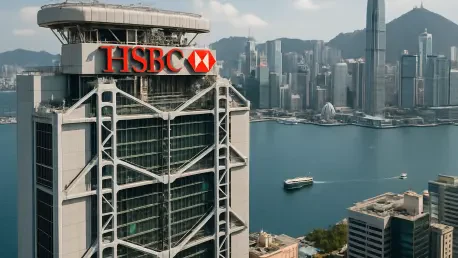What does it mean to pour £10 billion into a single market when global economic winds are anything but steady? HSBC, a titan of international banking, has made a jaw-dropping move to privatize Hang Seng Bank, its Hong Kong subsidiary, in a deal that has sent shockwaves through financial circles. This isn’t just about numbers on a balance sheet; it’s a daring bet on a city often caught in the crosshairs of geopolitical strife and economic uncertainty, yet still seen as a golden gateway to Asia’s wealth.
The significance of this transaction lies in its scale and timing. With Hong Kong facing scrutiny over its economic stability amid China’s property market woes, HSBC’s decision to acquire the remaining 36.5% of Hang Seng Bank shares and delist it from the Hong Kong stock exchange marks the region’s largest bank deal in over a decade. This strategic pivot toward Asia, where HSBC generates most of its profits, raises critical questions about risk, reward, and the future of global finance in a city that bridges East and West.
Why Hong Kong Remains HSBC’s Cornerstone
Hong Kong holds a unique position in HSBC’s global portfolio, serving as a vital conduit to China’s sprawling economic landscape. Often dubbed a “super-connector,” the city links mainland markets with international investors, making it indispensable despite challenges like a faltering real estate sector. For HSBC, headquartered in London but deeply rooted in Asia, this market isn’t just a profit center—it’s the heart of its growth strategy.
This investment signals unwavering confidence in Hong Kong’s role as a financial powerhouse. Even as political tensions and economic slowdowns cast shadows, HSBC views the city as a linchpin for tapping into Asia’s long-term potential. The bank’s leadership sees beyond immediate hurdles, focusing on the city’s enduring ability to facilitate capital flows and business connections across borders.
Unpacking the £10 Billion Privatization Deal
The mechanics of this deal are staggering in scope. HSBC’s acquisition of the remaining shares of Hang Seng Bank, valued at £10 billion, effectively takes the subsidiary private, removing it from public trading on the Hong Kong stock exchange. This move, the biggest of its kind in the region in over a decade, consolidates HSBC’s control and aligns with its broader aim to deepen its Asian footprint.
Financially, the deal comes with trade-offs that have rattled markets. To fund the acquisition and maintain a strong capital buffer against potential economic shocks, HSBC has suspended share buybacks for the next three quarters. The immediate fallout was evident—a 5% drop in its London-listed shares—reflecting investor unease over redirected funds that could have boosted shareholder returns.
Strategically, this privatization is more than a power play; it’s a calculated step to streamline operations in a key market. By fully owning Hang Seng, HSBC can better navigate regional challenges and capitalize on growth opportunities, though the short-term costs have sparked debates about the timing and priorities of such a massive investment.
Stakeholder Reactions: Hope and Hesitation
HSBC’s Chief Executive, Georges Elhedery, has been vocal about the rationale behind this bold move, emphasizing Hong Kong’s potential as a global financial hub. “This investment reflects our deep belief in the city’s unique position to drive economic connectivity,” Elhedery stated, highlighting a vision of long-term prosperity. His optimism paints a picture of a bank ready to double down on a market others might shy away from.
Yet, not all voices echo this confidence. Investors, stung by the suspension of buybacks, have expressed frustration, with Russ Mould, investment director at AJ Bell, likening their sentiment to “a child denied a treat.” This analogy captures the tension between HSBC’s strategic ambitions and the immediate expectations of shareholders seeking returns over reinvestment.
Critics also point to Hang Seng’s exposure to China’s troubled property market as a looming risk. Concerns about bad debts tied to the real estate downturn have fueled skepticism about whether this deal, however visionary, might be overburdened by regional economic frailties. These contrasting perspectives reveal a complex web of optimism and caution surrounding the transaction.
Strategic Maneuvers Amid Economic Headwinds
Beyond the headlines, this deal fits into HSBC’s broader restructuring under Elhedery’s leadership. The bank has been reshaping its global presence, implementing cost-cutting measures and exiting less profitable markets to focus on high-growth regions like Asia. This privatization aligns with a streamlined approach, dividing operations into eastern and western divisions for sharper efficiency.
Addressing immediate risks, HSBC has pushed Hang Seng to tackle bad debts linked to China’s property sector downturn. This proactive stance on risk management shows an awareness of the economic challenges that could undermine the deal’s success. Balancing these short-term fixes with long-term ambitions, the bank aims to fortify its position in Hong Kong without losing sight of financial stability.
The broader lesson here is one of strategic patience. HSBC’s willingness to sacrifice short-term shareholder gains for a stronger foothold in Asia underscores a belief that regional growth will eventually outweigh current sacrifices. This approach offers a glimpse into how global banks navigate turbulent markets while eyeing future rewards.
A Defining Moment for HSBC’s Asian Ambitions
Looking back, HSBC’s £10 billion investment to privatize Hang Seng Bank stood as a pivotal chapter in its Asian journey. The deal underscored a resolute commitment to Hong Kong as a financial bridge between China and the world, even as it navigated shareholder discontent and regional economic risks. It was a testament to the bank’s vision of Asia as its primary growth engine.
Reflecting on this move, the path forward demanded careful monitoring of China’s property market and a steady hand in managing investor relations. HSBC needed to ensure that Hang Seng’s integration delivered tangible results, justifying the financial trade-offs. Strengthening transparency around risk mitigation strategies could have rebuilt trust among stakeholders.
Ultimately, the success of this gamble hinged on adaptability. HSBC had to remain agile, ready to adjust its approach if economic conditions in Hong Kong or China shifted unexpectedly. This moment in the bank’s history served as a reminder that bold investments, while risky, could redefine a company’s trajectory if paired with foresight and resilience.









